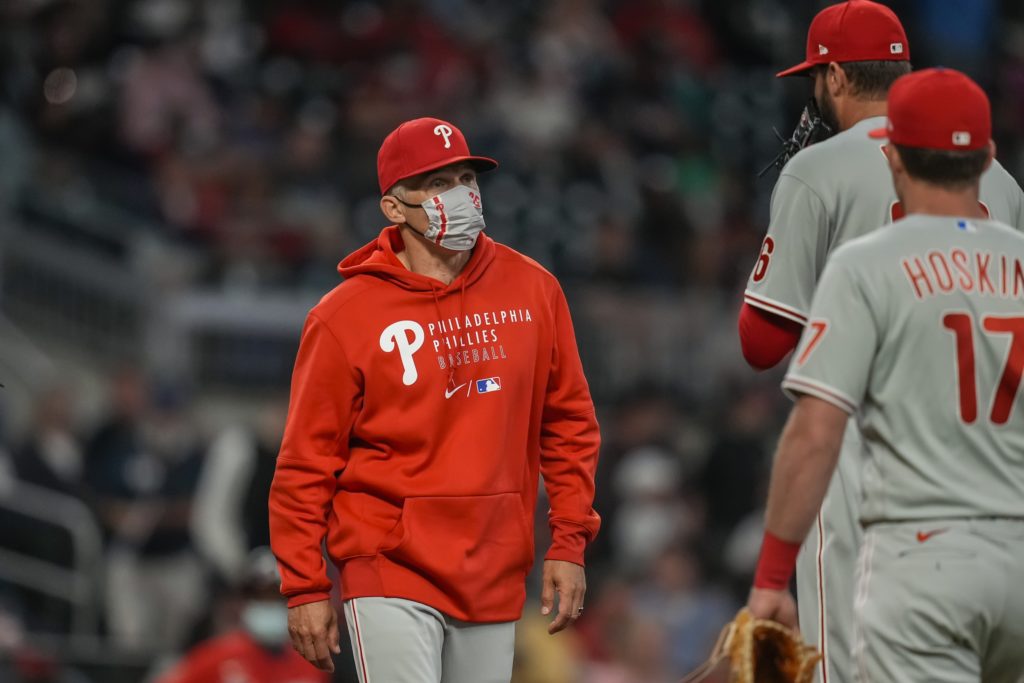Ad Disclosure
Forget Phils’ New Approach, MLB Should Be All-In with Injury Reports
By Bob Wankel
Published:

Let’s talk about Joe Girardi.
After his team salvaged a series split in Miami on Thursday afternoon, the Phillies manager rebuffed a question by Matt Gelb of The Athletic about why second baseman Jean Segura didn’t remain in the game following an eighth-inning pinch-hit appearance:
Just so you guys know, we’re going to approach this different. I’ve talked to people in our organization, just a manager’s decision, and I’m not going to share anything – who’s available, who’s not available because I think it’s somewhat unfair to us. Just like if you were to do something, you’re not necessarily going to share it with a rival reporter, so that’s the way we’re going to handle it. Just manager’s decision.
All right.
Naturally, Girardi’s comments led to discourse about poor messaging from the team to its paying customers, the overall state of media access, and, of course, the absurd notion that withholding information about a jammed thumb or bruised elbow will lead to a meaningful competitive advantage.
But that’s not the real story here. At least it is not the one that matters from a business standpoint, as Girardi’s comments draw attention to the awkward growing marriage between Major League Baseball and the sports betting industry.
Upon first hearing about the Phillies’ new stance on disseminating injury info, I immediately thought about the pregame in-stadium DraftKings Sportsbook advertisement I see whenever I cover a game from the press box.
New players, be sure to bet $1 to win $100 at DraftKings Sportsbook, official sportsbook partner of the Phillies!
I also thought about those PointsBet plugs that drive entire segments during Phillies Pregame Live and Phillies Postgame Live, shows that air on NBC Sports Philadelphia, the team’s television broadcast partner. There’s host Michael Barkann and analyst Ricky Bottalico breaking down the night’s pitching matchup and whether or not the Phillies will go over the team total of 3.5 runs.
Problem is, betting is a difficult proposition, one that becomes even more difficult if a team doesn’t disclose injury information, whether in a futile attempt to gain a competitive advantage or simply to prove a point.
If Major League Baseball wants to play ball with sports betting companies, that’s great, but the league and its teams need to hold up its end of the bargain. Clubs, in this case the Phillies, can’t have it both ways. They can’t run in-stadium ads and place logos throughout the park only to hold back key information that is needed to, you know, actually bet on the games.
What baseball has with this Phillies story is a learning opportunity and it would do well, for once, to take a gift and run with it.
No doubt, baseball is a struggling sport, one that needs to fully capitalize on the jolt in interest provided by legal sports betting. Nightly action on player props, game props, and standard game odds provides added eyes balls, attention, and relevance to a sport that in recent years has slowly lost these very things.
To this end, forget the Phillies’ newest messaging approach with injuries, baseball should instead go all-in on sports betting by requiring mandatory injury reports during pregame media sessions in an effort to make the game as friendly as possible to bettors.
Look at the NFL, a league that has for years – even before it formed legal sports betting partnerships – required teams to provide mandatory in-season injury updates. The NBA, too, requires similar day-of injury reports, and such reports matter to an industry that has helped grow these leagues to previously unimaginable heights.
League execs don’t enforce injury updates to drive sports talk radio discussion or cause fans anxiety leading up to a game. They enforce such updates because there’s big money in sports betting, and, as it turns out, it’s important for overall market confidence to know who’s in, who’s out, and who may not be playing at full-strength. Bettors want to know if the quarterback or point guard will be sidelined before they lay the points. They want to know if the running back or small forward may be limited before they lock in a prop bet. Go figure.
Baseball requires teams post lineups and pitching matchups, revealing tools to a degree, but if there’s a possibility a top bat or key reliever may not be available, there’s no harm in placing a “questionable” tag next to that player’s name.
Ultimately, a team can maintain some degree of its coveted ambiguity and cash those sponsorship checks. Best of all, it can do so without thumbing its nose at fans while simultaneously encouraging them to sign up and place bets.
Bob Wankel covers the Phillies for Crossing Broad. He is also the Vice President of Sports Betting Content at SportRadar. On Twitter: @Bob_Wankel E-mail: b.wankel@sportradar.com